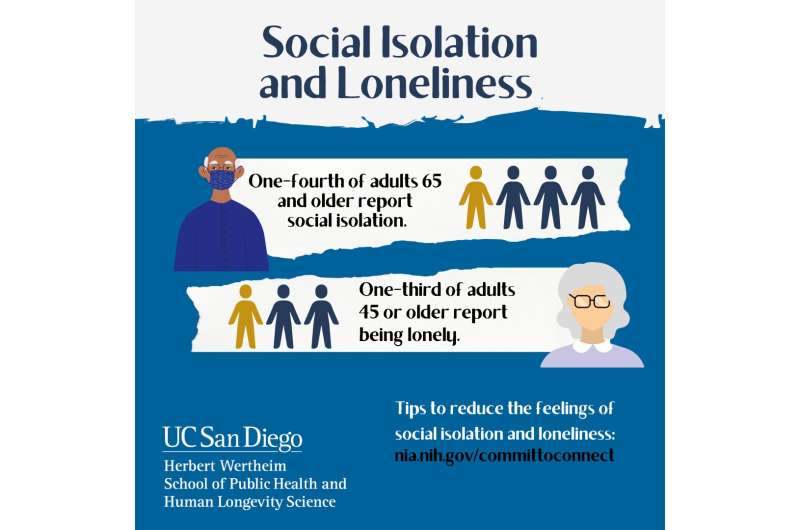
During the current pandemic, social distancing has been one tool used to reduce the spread of COVID-19. But data from a new study point to as much as a 27% increase in heart disease risk in postmenopausal women who experience both high levels of social isolation and loneliness.
The findings of the prospective study, published in the February 2, 2022 online issue of JAMA Network Open, reveal that social isolation and loneliness independently increased cardiovascular disease risk by 8% and 5% respectively. If women experienced high levels of both, their risk rose 13% to 27% compared to women who reported low levels of social isolation and low levels of loneliness.
“We are social beings. In this time of COVID-19, many people are experiencing social isolation and loneliness, which may spiral into chronic states,” said first author Natalie Golaszewski, Ph.D., a postdoctoral scholar at the Herbert Wertheim School of Public Health and Human Longevity Science at University of California San Diego. “It is important to further understand the acute and long-term effects these experiences have on cardiovascular health and overall well-being.”
Importantly, social isolation and loneliness are mildly correlated and can occur at the same time, but they are not mutually exclusive. A socially isolated person is not always lonely and conversely a person experiencing loneliness is not necessarily socially isolated.
“Social isolation is about physically being away from people, like not touching or seeing or talking to other people. Loneliness is a feeling, one that can be experienced even by people who are regularly in contact with others,” said senior author John Bellettiere, Ph.D., M.P.H., assistant professor of epidemiology at the Herbert Wertheim School of Public Health.
Social isolation and loneliness are a growing public health concern as they are associated with health conditions that increase the risk of cardiovascular disease including obesity, smoking, physical inactivity, poor diet, high blood pressure and high cholesterol.
When researchers included all of these health behaviors and conditions in their study and adjusted for diabetes and depression, high social isolation and loneliness remained strongly linked with increased risk for heart disease, supporting the importance of studying these social conditions.
According to the Centers for Disease Control and Prevention, heart disease is the leading cause of death for women in the United States, responsible for 1 in every 5 deaths.
As social networks shrink, older adults are more at risk for social isolation and loneliness, wrote the authors. One-fourth of adults 65 and older report social isolation and one-third of adults 45 or older report being lonely.
“We do not yet know whether the increased risk of cardiovascular disease is due to acute exposure to social isolation and loneliness or whether prolonged exposure accumulated over a lifetime is the culprit. Further studies are needed to better understand that,” said Bellettiere.
Previous research indicates women experience more social isolation than men.
For this study, 57,825 postmenopausal women living in the United States who had previously participated in the Women’s Health Initiative study responded to questionnaires assessing social isolation from 2011 to 2012. They were sent a second questionnaire assessing loneliness and social support in 2014 to 2015.
Participants were followed from the time of the questionnaire completion through 2019 or when they were diagnosed with cardiovascular disease. A total of 1,599 women experienced cardiovascular disease.
“Measures of social isolation and loneliness—even with brief questions as was done in our study—should be incorporated into standard care,” said Golaszewski. “We monitor our patients’ blood pressure, weight and temperature, and it might also be beneficial to capture the social needs that individuals may be lacking to better understand cardiovascular risk and develop solutions.”
Source: Read Full Article


